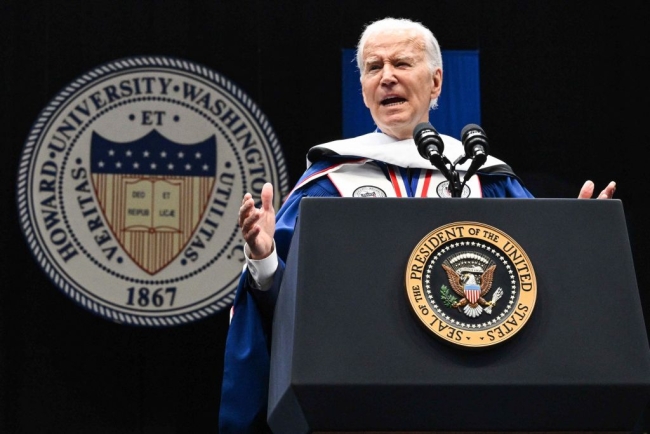You have /5 articles left.
Sign up for a free account or log in.

President Joe Biden delivering the commencement address to Howard University graduates in 2023.
MANDEL NGAN/AFP via Getty Images
When Joe Biden ran for the presidency four years ago, young people and Black voters helped drive his win.
But this election cycle, Biden has his work cut out for him. While 57 percent of voters ages 18 to 34 report they’re “extremely likely” to vote, only 44 percent of Black young people say the same, and young voters overall are less sure of who they plan to vote for, according to a poll from the Center for Information and Research on Civic Learning and Engagement at Tufts University. Of those “extremely likely” to vote, 51 percent prefer a Democratic candidate, but among youth polled overall, 31 percent say they’re undecided.
“I’m still waiting to hear what the candidates have to say at their presidential debates,” Zuri Primos, a first-year student at Dillard University, a historically Black university in Louisiana, recently told The Hilltop, Howard University’s student newspaper. “I find it is redundant and ineffective that we are forced to side with the ‘lesser of two evils’ each four years.”
The Biden administration is working to win these voters over with visits to historically Black colleges and universities (HBCUs) and appeals to their students.
Some HBCU leaders say the Biden administration’s outreach to and support for the institutions hasn’t gone unnoticed, and his efforts may bring him one step closer to winning over Black and youth voters come election time. However, some HBCU scholars also say policy promises unfulfilled, the administration’s strong support for Israel as it wages war in Gaza, and the administration’s failure to make Black students more aware of policy successes that benefit Black communities could also lose him HBCU student votes.
“I find students right now to be quite disenchanted with the political process,” said Melanye Price, director of the Ruth J. Simmons Center for Race and Justice at Prairie View A&M University in Texas.
The Biden administration has “been intentional about lifting up HBCUs in terms of speaking about why they are important and talking about HBCUs within the context of larger agenda items they have,” said Ivory Toldson, a professor of counseling psychology at Howard University in Washington D.C. and chief of research at Concentric Education Solutions, an education consulting firm. He formerly served as the executive director of the White House Initiative on Historically Black Colleges and Universities under former President Barack Obama and is the national director of Education Innovation and Research for the National Association for the Advancement of Colored Persons.
“Overall, I’d give them high marks on how they’ve handled HBCUs,” he said of the Biden administration.
The Biden campaign has been playing up the administration’s efforts to support these institutions. The campaign website says the administration invested upwards of $7 billion in HBCUs, including $1.6 billion in capital finance debt relief to 45 of these institutions, $1.7 billion in grants to build up “academic capacity” and supports for low-income students and $3.6 billion through the American Rescue Plan and other COVID-19 relief funds. Biden’s campaign also recently publicized that funding in a targeted ad focused on HBCUs in February, The Root reported.
“Joe Biden and Kamala Harris are investing a record $7 billion in HBCUs,” a voice reads over flashing photos of Biden and Harris, HBCU campuses and students. “Billions for campus improvements, grants, and debt relief. Billions more for HBCUs, endless possibilities for us.”
Harris, a Howard University alumna, also included multiple HBCUs on her “Fight for Our Freedoms College Tour” last fall, focused on issues important to young people such as reproductive rights, climate change, LGBTQ+ equality, book bans and gun control. She was also the commencement speaker at Tennessee State University in 2022. (Biden gave the commencement address at Howard University last May.) She also hosted a convening of about 100 HBCU students and alumni in Washington D.C. for Black History Month this year.
“As a proud Bison, it was my honor to welcome our nation’s HBCU students to the White House,” she posted on Instagram with a photo of the students.
‘History-Making’ Support
HBCU advocates highlighted a few particular policy items advanced by the Biden administration that they think bode well for him come election time.
Lodriguez Murray, senior vice president of public policy and government affairs at the United Negro College Fund, which represents private HBCUs, pointed out that the Biden administration came out of the gate with strong support for HBCUs. Notably, Biden’s proposed Build Back Better Act, a social spending package to advance various parts of his policy agenda, included about $10 billion for minority-serving institutions, including HBCUs. While the original bill didn’t secure the support it needed in Congress and these ambitious funding goals were pared down, Murray still regards it as a “history-making” moment, because “rarely have presidential, large-scale plans, from the get-go, included HBCUs in a major way,” he said.
Biden also gave HBCUs a shout-out in his State of the Union address last month and included increases for the U.S. Department of Education’s Strengthening Historically Black Colleges and Universities Program in his budgets three times since he’s been in office, Murray noted.
Those moves are especially meaningful “when you are an entity, a group of institutions that has been historically underfunded and historically not included,” Murray said.
David Sheppard, chief business and legal officer at the Thurgood Marshall College Fund, which represents public HBCUs, said HBCU leaders considered American Rescue Plan funds allotted specifically for minority-serving institutions, including COVID-19 relief dollars that could be used for some campus infrastructure needs, a major win under the Biden administration.
Sheppard, who supervises TMCF’s government-relations team, said the funding was a “big deal” given that HBCUs had fewer endowment funds on hand to weather the COVID-19 crisis and need “billions upon billions of dollars” for deferred maintenance projects and new academic facilities to stay competitive.
He also applauded the U.S. Department of Education and the U.S. Department of Agriculture for calling attention to the longstanding underfunding of historically Black land-grant institutions by state legislatures. Education Secretary Miguel Cardona and Agriculture Secretary Tom Vilsack sent joint letters to 16 state governors last fall telling them exactly how much each state owed its HBCUs according to the departments’ data.
“That’s something that has not happened in the history of our country,” he said. “An administration raising this issue of consequence into the public consciousness of our nation is material.”
Toldson noted that Biden also advanced policies focused not directly on HBCUs but on the kinds of students that they serve, which could affect votes, as well. He believes Biden’s calls for student debt relief in particular could appeal to HBCU student voters because Black students are disproportionately saddled with student debt.
Messaging Troubles
Price, of Prairie View A&M University, said Biden’s campaign so far has underemphasized certain policies that could win him points with HBCU students.
Price, whose research background is in political science, said she isn’t endorsing any candidate, but she believes it would be in Biden’s interest to stress the tangible impacts COVID-19 relief funds had on students’ lives.
That money was “transformational for a lot of our students and their ability to stay in school,” she said, noting that many HBCUs used those funds to wipe students’ outstanding balances.
Biden could be saying, “That money that was used to pay off many of your bills in the last three years … I did that,” she said.
She added that while Biden’s loftier plans for student debt relief were struck down by the U.S. Supreme Court last year, he should be emphasizing the billions of dollars doled out to borrowers through the Public Service Loan Forgiveness program.
“Me and three of my older sisters all have had their loans forgiven in the last three years,” she said. “That's also true of lots of people who work at historically Black colleges … lots of Black women, Black men, people of color, who have worked in public service.”
Despite these policy moves that could make Biden “palatable” to Black student voters, Price said his support for Israel in the Israel-Gaza war is still a major obstacle.
Many “young people are not with him on that,” she said. “And young people are paying attention to what’s happening.”
Olivia Ratliff, a sophomore at South Carolina State University told NBC News, that “as Black voters, we have the ability to empathize with the people of Gaza because we have a history of oppression.”
“It’s really hard for our president and our lawmakers to understand that because they’ve never been in a situation where they’ve been oppressed like the people of Gaza have,” she said.
Still Unmet Needs
HBCU leaders also have had some disappointments during Biden’s tenure.
Sheppard cited the dearth of federal research grants for HBCUs. One of Biden’s policy proposals in his 2020 campaign would have required universities with endowments of more than $1 billion to use a portion of federal research dollars to subcontract with HBCUs or other minority-serving institutions.
HBCU leaders celebrated that idea but the proposal “has not materialized and is a disappointment,” Sheppard said.
Murray added that the Education Department’s chaotic rollout of the new Free Application for Federal Student Aid has also been particularly hard on HBCUs, where at least 70 percent of students are eligible for Pell Grants, federal financial aid for low-income students.
Toldson noted that Biden also promised about $45 billion to HBCUs in his original Build Back Better plan and “that was reduced by Congress down to about 2 billion.”
Voters may view this as going back on campaign promises which “could work against him,” Toldson said. “But I think overall people understand what he’s trying to do” and that he’s limited by the constraints of the legislative process.
He also hopes the demise of Biden’s sweeping student debt–relief plan isn’t perceived as a “reneged promise” and that Biden continues to emphasize the importance of debt relief on the campaign trail and the barriers that have gotten in the way.
’Bigger and Better’?
Former President Donald Trump is also sure to bring up his contributions to HBCUs on the campaign trail, as he’s done in the past. HBCU advocates say they also had some notable wins during his presidency.
Murray, who emphasized that UNCF is nonpartisan, praised Trump for signing the FUTURE Act, advanced by a bipartisan group of lawmakers in Congress, which made permanent $255 million in annual mandatory funding for minority-serving institutions, including $85 million for HBCUs.
He added that Trump also regularly worked HBCUs into his speeches.
“I believe that there were people, whether it be in Wall Street boardrooms or in the heartland of America, who got to know historically Black colleges and universities and our successes through the prism of President Trump speaking about them so often,” Murray said.
Sheppard similarly noted Trump’s legislative successes, including his signing of the HBCU PARTNERS Act to strengthen federal agencies partnerships with HBCUs, though he said it’s hard to disentangle who deserves the credit, Trump or Congress.
“There were initiatives at which we were successful in working with both administrations,” Sheppard said. That said, “we have made more progress under the Biden administration than we made under the Trump administration.”
Murray believes candidates’ support for HBCUs will play a role in how people vote at a time when higher education is at the forefront of national conversations.
“I think education is on the ballot,” he said. “I think how students from the most underserved backgrounds access higher education is on the ballot. And I believe that how administrations treat historically Black colleges and universities, as well as the students that they historically served, showcases the type of vision that they have for this country.”





